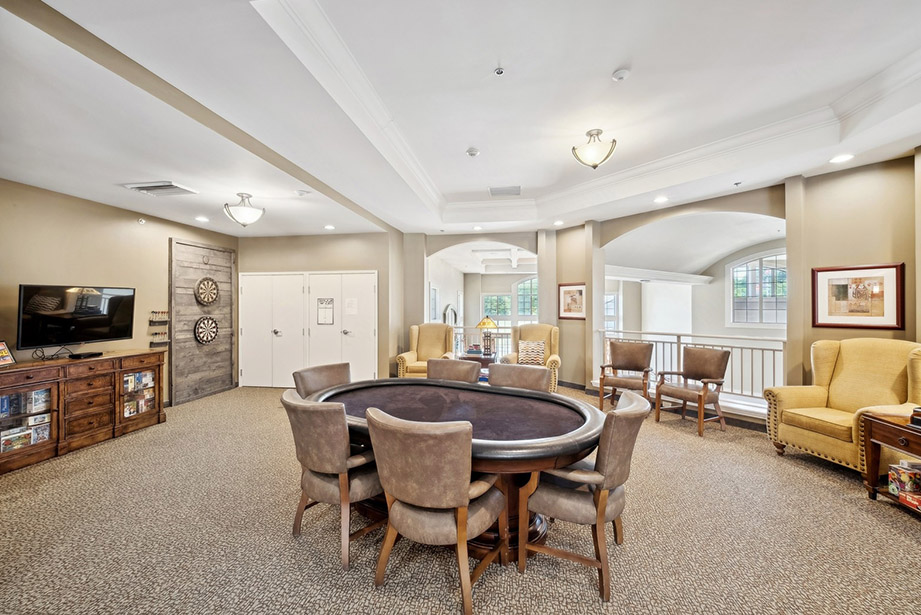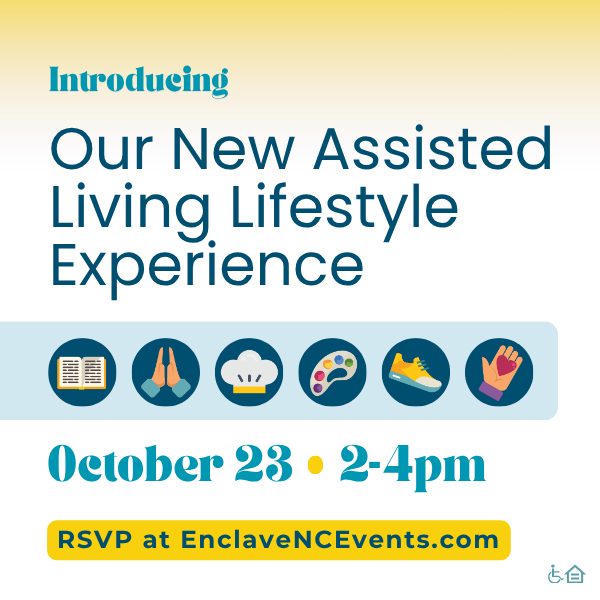Key Takeaways
- Memory care is a long-term care option designed for people with Alzheimer’s or dementia
- It offers structured routines, safety features, and trained staff for personalized care
- Signs it may be time for memory care include wandering, confusion, and difficulty with daily tasks
- Additional indicators include behavioral changes, social withdrawal, and caregiver stress
- Memory care communities use thoughtful design to reduce risk and support independence
When Full-Time Memory Care Becomes Necessary
When a loved one begins showing signs of memory loss, it’s natural to wonder what comes next. For many families, the idea of full-time memory care can feel like a big leap. It’s a big decision, but it often brings the support and structure your loved one truly needs.
Memory care is designed specifically for people living with Alzheimer’s or dementia. You might notice your loved one needs more help than family members can reasonably provide, even with the support of home care services. If this sounds familiar, it’s likely time to consider full-time memory care for your loved one.
The Basics of Memory Care
Memory care is a long-term care option for older adults. Unlike other types of senior living, memory care is entirely focused on supporting people experiencing cognitive decline and memory loss. These communities offer a safe, structured setting to keep residents safe, comfortable, and happy.
One of the biggest advantages of memory care is its focus on both comfort and stability. In memory care, residents receive help with daily routines, enjoy mentally engaging activities, and benefit from safety measures like secured entrances and exit monitoring.
When Is It Time for Memory Care?
Knowing when to make the move to memory care isn’t always easy. Often, it’s a series of changes—rather than a single moment—that signals a need for more support.
Safety Becomes a Daily Concern
Wandering, forgetting to turn off appliances, and leaving doors unlocked can all put your loved one at risk. These are all common signs of dementia, and they can put your loved one at serious risk of harm. If you’re frequently worried about what might happen when you’re not around, it may be time for a more secure environment.
Daily Tasks Become a Struggle
Bathing, dressing, and remembering to eat or take medications can become confusing or overwhelming. These challenges can lead to health issues over time, especially if missed doses or skipped meals become common.
Behavioral and Emotional Changes
Agitation, confusion about time or place, and difficulty recognizing loved ones may become more frequent. Changes in sleep—like staying awake at night or becoming restless—can also increase caregiver stress.
Health and Mobility Issues
Weight loss, frequent falls, and challenges with walking or swallowing often appear alongside cognitive decline. These shifts in physical health make consistent support and supervision even more important.
Withdrawal from Social Activities
People living with memory loss may stop doing things they once enjoyed or avoid conversations because following along is difficult. These changes can lead to isolation and depression without proper social engagement.

How Memory Care Communities Provide Specialized Support
A memory care setting provides more than just a safe place to live. It offers structure, purpose, and community to residents in need.
Familiar Routines That Bring Comfort
Daily schedules are designed to be predictable, which can help reduce anxiety. Activities like music, art, and sensory games help residents stay engaged and connected, even as their needs change. These routines also provide a sense of stability, and this plays a big role in easing confusion and supporting residents every day.
Caregivers Trained in Dementia Care
Care team members understand how to respond to confusion, manage emotions, and support each resident with kindness and patience. Families often feel a sense of relief knowing their loved one is in capable hands 24/7. Training also includes techniques for redirecting difficult behaviors and creating positive, validating interactions.
This support can be invaluable for families. It means you get to rest easy knowing that your loved one always has the support they need. With the right caregiving team, your loved one can thrive in their new community, just like they deserve.
Environments That Prioritize Safety and Dignity
Memory care communities are thoughtfully designed with safety features. Every part of the community, from the hallways to your loved one’s bedroom, is built to keep them safe.
To do so, memory care offers:
- Secured entryways and exits to prevent wandering
- Monitored hallways and common areas
- Clear signage and visual cues to reduce confusion
- Fall-reducing design elements like non-slip flooring
- Emergency call systems in resident rooms and bathrooms
- Motion-sensor lighting for nighttime navigation
Living spaces are also adapted to reduce frustration. The community focuses on minimizing clutter, noise, and overstimulation, while still encouraging movement and freedom. Every design choice reflects a respect for the person, not just their diagnosis.
Making the Transition to Memory Care
Choosing memory care means choosing a setting where your loved one can be supported, seen, and safe. It’s a step many families take out of love—and you don’t have to do it alone. Here at The Enclave of Newell Creek, we can offer your loved one a home designed to meet their needs every day and give them the quality of life they deserve.
In our community, we know the value of personalized care. Here, every person is treated as the unique individual that they are. Schedule a tour of our memory care community today and learn how we can support your family’s needs during this important decision.









